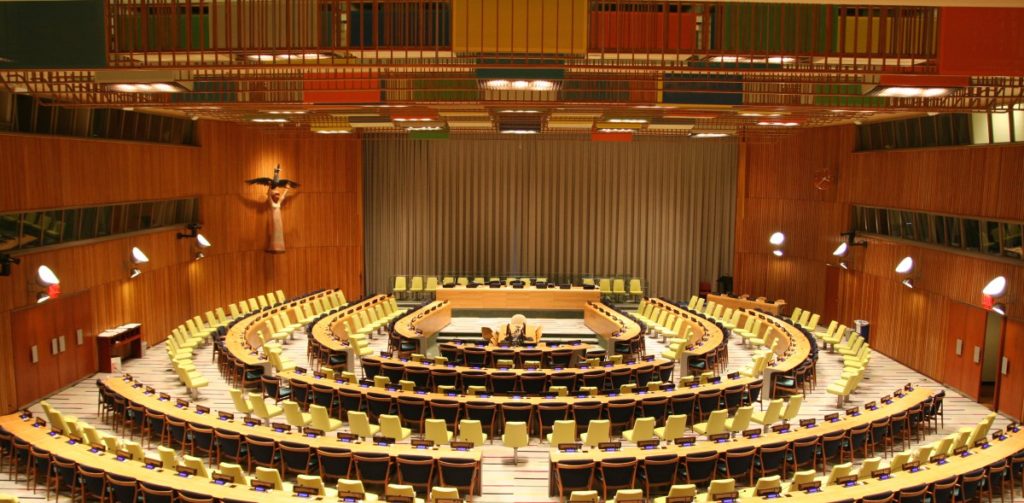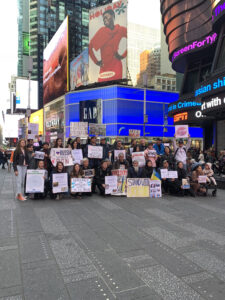Governments at the Table, NGOs on the Sidelines

United Nations Trusteeship Council chamber in New York City

It took four years to break the logjam, but in July, the Committee to Protect Journalists cut through opposition from the UN’s NGO Committee and gained consultative status in the world body, giving its representatives the right to speak at meetings, circulate documents within the UN, organize events and lobby diplomats. Yet even given CPJ’s protracted struggle for recognition, it has fared much better than other non-governmental groups seeking the same status.
Nine years ago, the International Dalit Solidarity Network, an organization working to end discrimination based on caste in countries like India, Japan and Yemen, requested consultative status from the UN. The IDSN’s request has yet to be approved or denied. This is the longest pending application of any nonprofit organization seeking UN recognition.
Non-governmental organizations at the UN give activists, volunteers and other members of society their best chance to influence global policy decisions. This is especially true for those whose countries give citizens little or no sway over who represents them. But the participation of these nonprofits in UN decision-making relies on the goodwill of governments, and for many NGOs, this means no representation at all. NGOs are at the discretion of the Committee on NGOs, whose membership rotates among the UN’s member states with the goal of providing “a just, balanced, effective and genuine involvement of non-government organizations.” Recently, the committee has been accused of withholding, suspending and even withdrawing the consultative status of NGOs as a form of reprisal for their activities.
According to the IDSN, India is blocking its application in a government-sanctioned effort to silence those who speak out about caste discrimination. The country is using its powers on the NGO Committee, the IDSN says, to submit repetitive and pointless questions and delay the approval of the NGO’s application—18 deferrals so far. In a statement, the Dalit network accused the committee of becoming the “tool of states that do not respect human rights and civil society.”
The IDSN isn’t the only NGO pending consultative status. In the last four years, the NGO Committee shelved 1,600 applications for consultative status and in 2016 alone, the committee deferred 480 requests, according to the US Mission to the UN.
To opponents, this lack of action is based on the committee’s perceived political motivations. “We are concerned about recent actions taken by the Committee […] some Committee members use procedural tactics to block certain organisations from being granted consultative status,” 230 NGOs wrote in an open letter to the committee in May.
NGOs and diplomats were first alarmed back in February, when China proposed that the names of countries seeking to block NGOs from consultative status be kept secret. Diplomats and activists were quick to point out China’s history of anti-NGO measures at the UN, including the accusation that China sends fake NGOs to the UN to promote Chinese government policies. The International Service for Human Rights, which advocated against the proposal, responded to it in a statement. “Access to information about the work of the Committee, including as to which country asked which question, is a basic principle of good governance.” This is “crucial to help to ensure that States cannot hide behind anonymity,” the ISHR said.
Maina Kiai, the UN Special Rapporteur on the exercise of rights to freedom of peaceful assembly and of association, has also spoken out against the NGO Committee’s decisions to withhold consultative status. “Space for ordinary people to exercise their fundamental freedoms—and to participate in their own governance—is closing at a rapid and disturbing pace worldwide,” he said in a statement. “What is less discussed is that space to exercise fundamental freedoms is closing at the international level as well.”
US Ambassador to the UN Samantha Power also advocates for more NGO representation. “The NGO committee looks more and more like an anti-NGO committee,” she said in a speech last July before the UN Economic and Social Council, which houses the NGO Committee. Despite awareness of the politicization of the committee, US support for NGO representation remains largely rhetorical. Prior to the General Assembly this September, the US State Department praised the Obama Administration’s involvement in the UN, asserting that it has deepened its engagement “with a single goal in mind: to pursue shared responses to the growing number of transnational challenges.”
But the US government’s definition of shared response clearly only applies to the international elite, namely foreign governments. Power is one of the few voices at the top who continues to insist on greater balance within the global system. Withholding consultative status from NGOs without reason “undermines the UN’s credibility when we call on governments to respect the rights of civil society within their own countries,” Power said. “And it is a huge loss for the UN, which is deprived of the groups’ contributions.”
Esmé Montgomery is a Masters student in both Journalism and International Relations at New York University. She graduated with a degree in English Literature from Trinity College, Dublin and also spent a year at Boston College in Massachusetts. Her areas of interest are climate change, domestic politics and foreign policy.






